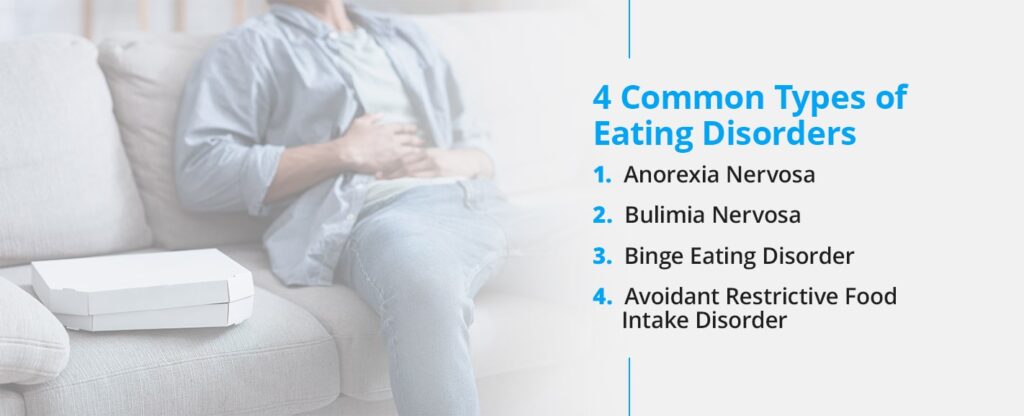Eating disorders are complex mental health conditions that can severely impact mental and physical health. As a result, they often require medical and mental health professionals to intervene and alter their course. Approximately 28 million people in the United States have an eating disorder at some point in their life. Common eating disorders include anorexia, bulimia, binge eating, and avoidant restrictive food intake disorder.
If you believe you or someone you know is struggling, learn the signs of eating disorders and how to get help.
What Is an Eating Disorder?
An eating disorder is a mental health condition associated with unhealthy eating habits. They might develop due to an obsession with food, body weight, or body shape. In severe cases, eating disorders can cause serious health problems or be fatal if left untreated.
Common eating disorder symptoms include severe restriction of food and binging and purging behaviors like overexercising or vomiting. While there are also different types of eating disorders, each one involves an extreme focus on food-related issues and eating, with some involving an excessive focus on weight.
This fixation on food and weight can make it difficult for people with eating disorders to focus on other parts of life. It can also significantly impact physical and mental health.
4 Common Types of Eating Disorders
Spotting an eating disorder isn’t always easy, though identifying symptoms early can help you seek professional help quickly to avoid health complications. There are four common types of eating disorders and symptoms people often struggle with. These include:
1. Anorexia Nervosa
Anorexia nervosa is one of the most well-known eating disorders. It often develops in adolescence and is more commonly diagnosed in girls, though it also affects boys. People with this condition view themselves as overweight even if they are significantly underweight. They will constantly monitor their weight, restrict their calorie intake, and avoid eating certain foods.
There are two subtypes of anorexia — restrictive and binge-purge subtypes. Those with the restrictive subtype severely limit the amount of food they consume. People with binge-purge subtype restrict the amount and type of food they consume and also have binge-eating and purging episodes or consume large amounts of food very quickly before vomiting or using laxatives to get rid of what was eaten.
Common symptoms and signs of anorexia include:
- Restricted eating patterns.
- Intense fear and shame of gaining weight.
- A distorted body image or denying that they are underweight.
- Persistent behaviors to avoid gaining weight.
- Unrelenting chase for perceived thinness.
- A heavy influence of body weight or perceived body shape on self-esteem.
Anorexia nervosa severely damages the body, including vital organs like the brain, heart, and kidneys. It is a mental health disorder likely stemming from anxiety and low self-esteem, though obsessive-compulsive disorder (OCD) symptoms might also be present. For instance, people with anorexia are preoccupied with unhealthy thoughts about food — many will even collect recipes or hoard food.
You can also spot signs of anorexia in people who have difficulty eating in public places or those with a strong desire to control their environment. They may lose weight solely through fasting, dieting, or excessive exercise. Over time, people with anorexia might experience thinning bones, infertility, lethargy, and brittle hair and nails.
2. Bulimia Nervosa
Bulimia nervosa is another common type of eating disorder. Like anorexia, it often develops in youth and early adulthood. People with bulimia frequently eat large amounts of food within a specific time. Each episode of binge eating continues until the person becomes uncomfortably full.
During a binge, the person will feel like they can’t stop eating or control the amount they are consuming. Binges can happen with any food, though they commonly happen with those the person would typically avoid. They will then purge to compensate for their consumed calories and relieve stomach discomfort through fasting, forced vomiting, laxatives, enemas, or excessive exercise. They may also purge to reduce feelings of guilt or shame about binging.
Symptoms of bulimia can appear similar to anorexia nervosa. However, those with bulimia typically maintain a specific weight rather than lose a large amount of weight.
Common symptoms and signs of bulimia include:
- Frequent episodes of binge eating with a feeling of lack of control.
- Frequent episodes of purging behaviors to avert weight gain.
- Self-esteem is highly influenced by body shape and weight.
- A fear of gaining weight, despite being a healthy or average weight.
People with bulimia might experience health complications like an inflamed or sore throat, severe dehydration, tooth decay, hormonal disturbances, or acid reflux. In extreme cases, bulimia can create an imbalance of electrolytes in the body, like potassium, sodium, and calcium, which can lead to a stroke or heart attack.
3. Binge Eating Disorder
Binge eating disorder is the most common eating disorder in the U.S. People with binge eating disorder share symptoms with those with bulimia nervosa and the binge eating subtype of anorexia. For example, they often consume vast amounts of food while lacking control during binges. They might also continue eating even when they are not hungry.
A primary difference is that people with this disorder do not limit their calorie intake or use purging behaviors to make up for the calories they consume through binging.
Signs of binge eating disorder include:
- Secretively eating large amounts of food rapidly and until uncomfortably full.
- Feeling a lack of control during binge-eating episodes.
- Feelings of guilt or disgust when thinking about the binge eating behavior.
People with this disorder will often not make nutritious food choices when consuming excessive amounts of food. This can increase their risk of health complications like stroke, heart disease, and type 2 diabetes.
4. Avoidant Restrictive Food Intake Disorder
Avoidant restrictive food intake disorder (ARFID) describes those who experience disturbed eating due to a lack of interest in eating. They might also experience distaste for specific smells, colors, tastes, temperatures, or textures.
More than just being picky eaters, they will avoid foods at the cost of their health and social functioning. This can lead to poor health as they do not receive the nutrition they need. People with ARFID often develop a dependence on oral supplements.
Common symptoms of an avoidant restrictive eating disorder include:
- Avoiding or restricting foods that prevent the person from getting enough nutrients or calories.
- Lack of interest in foods.
- Dramatic weight loss.
- Eating habits that disrupt social functions, such as an inability to eat around others.
- Losing weight or having poor development for age and height.
- Nutrient deficiencies or dependence on supplements.
Children with ARFID do not eat enough calories to grow and develop properly, while adults will not eat enough to maintain basic body function. Compared to other eating disorders, people with ARFID do not experience distress about body shape or size or fears of gaining weight.
If You or a Loved One Need Support, Turn to Merrimack Valley Psychological Associates in Andover for Help
A common misconception is that eating disorders are a lifestyle choice. In reality, eating disorders are serious and associated with severe health issues, disturbances in eating behaviors, and related emotions impacting mental health and wellness. At Merrimack Valley Psychological Associated, we can provide support for you or a loved one who might be experiencing common signs of eating disorders.
Our counseling services can help promote confidence and a healthier self-image while providing therapy for other conditions like OCD, anxiety, or depression. We offer a discreet and compassionate space to discuss any underlying issues that may contribute to your disordered eating. To learn more about our services or to schedule an appointment, contact us today.



